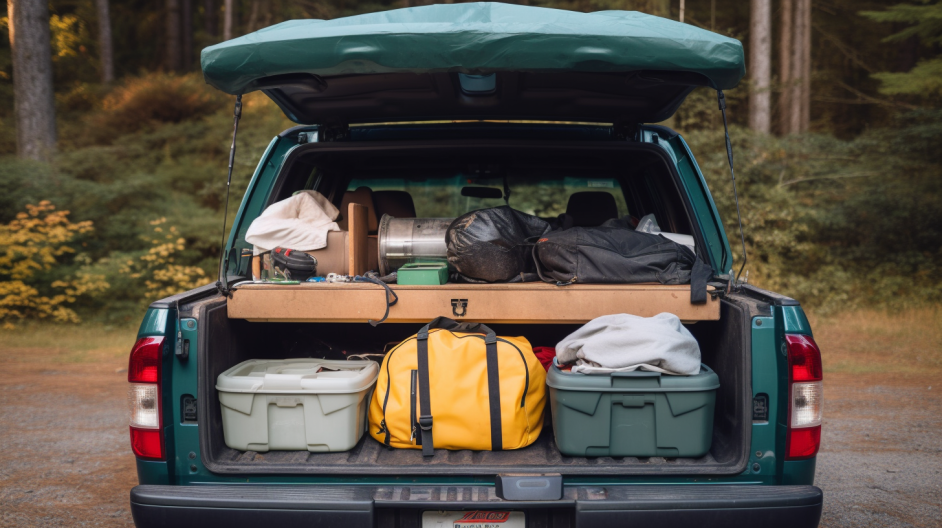Camping by a serene lake is a quintessential outdoor adventure that allows you to connect with nature, unwind, and escape the hustle and bustle of everyday life. Whether you’re an experienced camper or a novice looking to embark on your first lake camping trip, packing the right gear and essentials is crucial to ensure a comfortable and enjoyable experience. In this comprehensive guide, we’ll walk you through what to pack for a lake camping trip, from the essentials to the extras that can elevate your camping experience.
The Essentials:
1. Shelter and Sleeping Gear
- Tent: Choose a reliable and weather-appropriate tent that can accommodate your group size. Make sure it’s waterproof and comes with a rainfly.
- Ground Tarp or Footprint: This provides an extra layer of protection for your tent’s floor.
- Sleeping Bag: Select a sleeping bag suitable for the expected temperature range and weather conditions.
- Sleeping Pad or Air Mattress: These provide insulation and comfort while sleeping on the ground.
2. Clothing
- Weather-Appropriate Clothing: Check the weather forecast and pack clothing accordingly. Include layers for varying temperatures and weather conditions.
- Rain Gear: Pack a waterproof jacket, pants, and waterproof hiking boots in case of rain.
- Hats and Gloves: Protect yourself from the sun and cold weather.
- Swimwear: Don’t forget to bring swimsuits for a refreshing dip in the lake.
3. Cooking and Food Supplies
- Portable Stove and Fuel: A compact camping stove is essential for cooking meals. Ensure you have enough fuel for your entire trip.
- Cookware: Carry pots, pans, utensils, and a knife for food preparation.
- Food and Snacks: Plan your meals and bring non-perishable items such as dehydrated meals, canned goods, and snacks.
- Water Containers: Pack reusable water bottles or a hydration system, and consider a water filter or purifier for lake water.
- Biodegradable Soap and Washbasin: For dishwashing and personal hygiene.
4. Navigation and Safety
- Map and Compass/GPS: Even if you’re familiar with the area, it’s essential to have navigation tools.
- First Aid Kit: A basic first aid kit should include bandages, antiseptic wipes, pain relievers, and any personal medications.
- Multi-Tool or Knife: Useful for various tasks, including cutting, opening cans, and repairs.
- Headlamp/Flashlight: Ensure you have a reliable light source for nighttime activities.
- Firestarter: Bring waterproof matches or a lighter in a waterproof container.
- Emergency Whistle and Signaling Device: These are essential for alerting others in case of an emergency.
5. Hygiene and Toiletries
- Toothbrush, Toothpaste, and Dental Floss: Maintain oral hygiene.
- Toilet Paper and Trowel: For proper waste disposal (pack out used toilet paper).
- Hand Sanitizer: Maintain cleanliness when water is scarce.
- Biodegradable Soap: Use eco-friendly soap for washing dishes and personal hygiene.
- Towel or Washcloth: For bathing and cleaning up.
The Extras:
6. Camp Comfort
- Camp Chairs or Portable Seating: Relax by the fire with comfortable seating.
- Portable Table: Useful for meal prep and dining.
- Hammock: Set up a hammock between trees for a peaceful lakeside lounge.
7. Recreation and Entertainment
- Fishing Gear: If fishing is permitted, bring the necessary equipment.
- Canoe, Kayak, or Inflatable Raft: Enjoy water activities and exploration.
- Board Games or Playing Cards: For evening entertainment with friends and family.
- Binoculars and Field Guides: Enhance your wildlife and bird-watching experiences.
8. Campsite Organization
- Dry Bags or Compression Sacks: Keep your gear organized and dry, especially during water-based activities.
- Rope or Paracord: Useful for hanging food away from wildlife or setting up a clothesline.
- Trash Bags: Leave no trace by packing out all your garbage.
- Ziplock Bags: Keep small items organized and dry.
9. Personal Comfort
- Pillow: For a better night’s sleep.
- Insect Repellent: Protect yourself from pesky bugs.
- Sunscreen and Lip Balm: Shield your skin from harmful UV rays.
- Earplugs: Block out noise if you’re a light sleeper.
10. Photography and Documentation
- Camera and Accessories: Capture the beautiful moments and scenery.
- Notebook and Pen: Document your experiences or jot down observations.
- Binoculars: Enhance your view of wildlife and natural surroundings.
Packing Tips:
- Prioritize Essentials: Start with the essentials and work your way to the extras. Ensure that you have all the necessities first.
- Checklists: Create a checklist to avoid forgetting important items. Checklists can help you stay organized and reduce the chances of leaving something behind.
- Test Equipment: Before your trip, set up your tent, check your stove, and make sure all equipment is in working order.
- Weight Distribution: Distribute weight evenly in your backpack to avoid discomfort during hiking.
- Pack Efficiently: Use compression sacks and pack items in a logical order to maximize space and accessibility.
- Leave No Trace: Be responsible by adhering to Leave No Trace principles. Clean up after yourself, minimize campfire impact, and respect wildlife and fellow campers.
- Safety First: Be aware of local regulations and safety guidelines. Share your itinerary with someone you trust in case of emergencies.
- Plan for Emergencies: Consider carrying a satellite communication device for remote areas where cell phone reception is poor or nonexistent.
In conclusion, packing for a lake camping trip requires careful consideration of the essentials and thoughtful additions to enhance your comfort and enjoyment. By preparing in advance and following these packing guidelines, you’ll be well-equipped to embark on a memorable lake camping adventure. Remember to prioritize safety, respect the environment, and savor every moment of your time in the great outdoors. Happy camping!

